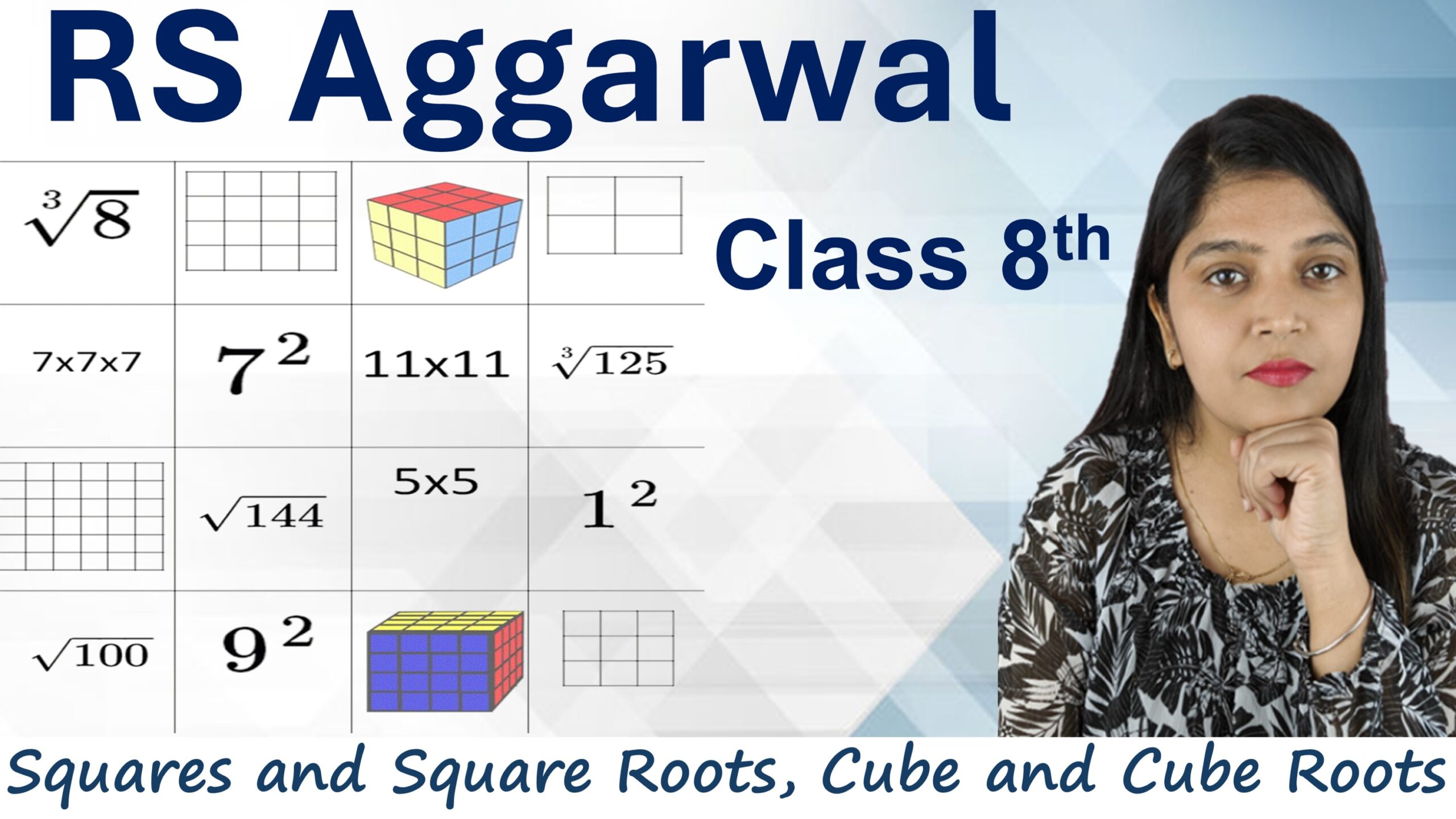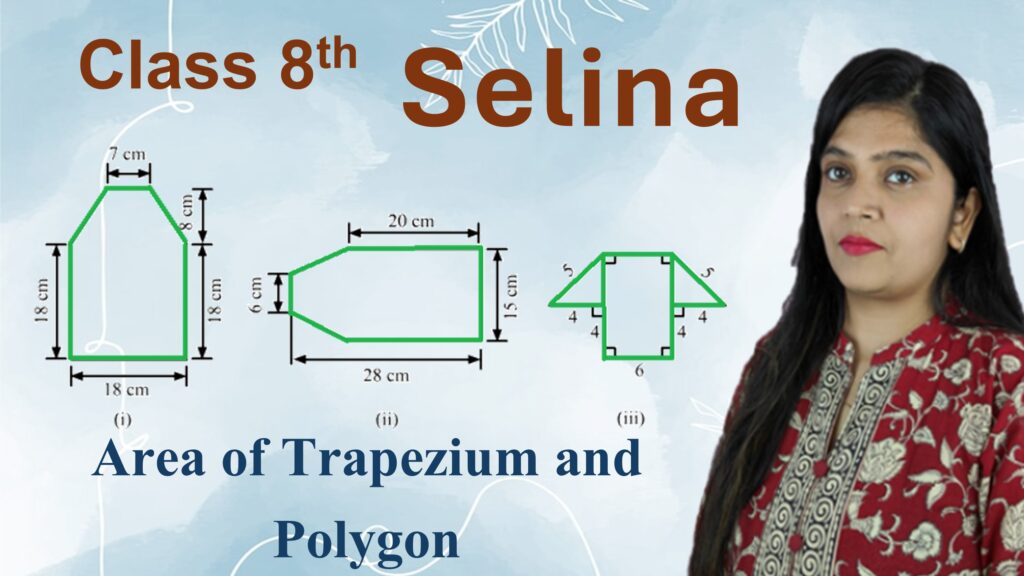Exercise: 3-E
Q1: Find the cubes of:
i. \(16^3\)
Step 1: Cube 16:
\[
16^3 = 16 \times 16 \times 16 = 4096
\]Answer: \(16^3 = 4096\)
ii. \(30^3\)
Step 1: Cube 30:
\[
30^3 = 30 \times 30 \times 30 = 27000
\]Answer: \(30^3 = 27000\)
iii. \(1.2^3\)
Step 1: Cube 1.2:
\[
1.2^3 = 1.2 \times 1.2 \times 1.2 = 1.728
\]Answer: \(1.2^3 = 1.728\)
iv. \(0.7^3\)
Step 1: Cube 0.7:
\[
0.7^3 = 0.7 \times 0.7 \times 0.7 = 0.343
\]Answer: \(0.7^3 = 0.343\)
v. \(0.06^3\)
Step 1: Cube 0.06:
\[
0.06^3 = 0.06 \times 0.06 \times 0.06 = 0.000216
\]Answer: \(0.06^3 = 0.000216\)
vi. \(\left(\frac{2}{5}\right)^3\)
Step 1: Cube \(\frac{2}{5}\):
\[
\left(\frac{2}{5}\right)^3 = \frac{2^3}{5^3} = \frac{8}{125}
\]Answer: \(\left(\frac{2}{5}\right)^3 = \frac{8}{125}\)
vii. \(\left(\frac{1}{9}\right)^3\)
Step 1: Cube \(\frac{1}{9}\):
\[
\left(\frac{1}{9}\right)^3 = \frac{1^3}{9^3} = \frac{1}{729}
\]Answer: \(\left(\frac{1}{9}\right)^3 = \frac{1}{729}\)
viii. \(\left(1\frac{3}{5}\right)^3\)
Step 1: Convert the mixed number to an improper fraction:
\[
1\frac{3}{5} = \frac{8}{5}
\]Step 2: Cube \(\frac{8}{5}\):
\[
\left(\frac{8}{5}\right)^3 = \frac{8^3}{5^3} = \frac{512}{125}
\]Answer: \(\left(1\frac{3}{5}\right)^3 = \frac{512}{125}\)
Q2: Examine which of the following numbers are perfect cubes. In case of perfect cube, find the cube root:
i. \(729\)
Step 1: Check if 729 is a perfect cube:
\[
\sqrt[3]{729} = 9 \quad \text{(since \(9^3 = 729\))}
\]Answer: \(729\) is a perfect cube, and the cube root is \(9\)
ii. \(1331\)
Step 1: Check if 1331 is a perfect cube:
\[
\sqrt[3]{1331} = 11 \quad \text{(since \(11^3 = 1331\))}
\]Answer: \(1331\) is a perfect cube, and the cube root is \(11\)
iii. \(5324\)
Step 1: Check if 5324 is a perfect cube:
\[
\sqrt[3]{5324} \approx 17.2 \quad \text{(not an integer, hence not a perfect cube)}
\]Answer: \(5324\) is not a perfect cube
iv. \(3375\)
Step 1: Check if 3375 is a perfect cube:
\[
\sqrt[3]{3375} = 15 \quad \text{(since \(15^3 = 3375\))}
\]Answer: \(3375\) is a perfect cube, and the cube root is \(15\)
v. \(9261\)
Step 1: Check if 9261 is a perfect cube:
\[
\sqrt[3]{9261} = 21 \quad \text{(since \(21^3 = 9261\))}
\]Answer: \(9261\) is a perfect cube, and the cube root is \(21\)
vi. \(5832\)
Step 1: Check if 5832 is a perfect cube:
\[
\sqrt[3]{5832} = 18 \quad \text{(since \(18^3 = 5832\))}
\]Answer: \(5832\) is a perfect cube, and the cube root is \(18\)
vii. \(1728\)
Step 1: Check if 1728 is a perfect cube:
\[
\sqrt[3]{1728} = 12 \quad \text{(since \(12^3 = 1728\))}
\]Answer: \(1728\) is a perfect cube, and the cube root is \(12\)
viii. \(10584\)
Step 1: Check if 10584 is a perfect cube:
\[
\sqrt[3]{10584} \approx 21.5 \quad \text{(not an integer, hence not a perfect cube)}
\]Answer: \(10584\) is not a perfect cube
Q3: Find the smallest by which 1323 must multiplied so that the product is a perfect cube.
Step 1: First, find the prime factorization of 1323:
\[
1323 \div 3 = 441
\]
\[
441 \div 3 = 147
\]
\[
147 \div 3 = 49
\]
\[
49 = 7 \times 7
\]
Thus, the prime factorization of 1323 is:
\[
1323 = 3^3 \times 7^2
\]Step 2: To make 1323 a perfect cube, all exponents must be multiples of 3. Currently, the exponent of 7 is 2, which is not a multiple of 3. We need to multiply by one more 7 to make the exponent of 7 equal to 3.
Step 3: Multiply by 7 to make the exponent of 7 equal to 3:
\[
1323 \times 7 = 3^3 \times 7^3
\]
Now, the product is a perfect cube.
Answer: The smallest number by which 1323 must be multiplied is \(7\), making the product \(1323 \times 7 = 9261\), which is a perfect cube.
Q4: What is the smallest number by which 1600 must be divided so that the quotient is a perfect cube?
Step 1: First, find the prime factorization of 1600:
\[
1600 \div 2 = 800
\]
\[
800 \div 2 = 400
\]
\[
400 \div 2 = 200
\]
\[
200 \div 2 = 100
\]
\[
100 \div 2 = 50
\]
\[
50 \div 2 = 25
\]
\[
25 \div 5 = 5
\]
\[
5 \div 5 = 1
\]
Thus, the prime factorization of 1600 is:
\[
1600 = 2^6 \times 5^2
\]Step 2: To make the quotient a perfect cube, all exponents must be multiples of 3. The exponent of 2 is 6, which is already divisible by 3. However, the exponent of 5 is 2, which is not divisible by 3. We need to divide by one more 5 to make the exponent of 5 equal to 3.
Step 3: Divide by 5 to make the exponent of 5 equal to 3:
\[
\frac{1600}{25} = 2^6
\]
Now, the quotient is a perfect cube.
Answer: The smallest number by which 1600 must be divided is \(25\), making the quotient \(1600 \div 25 = 64\), which is a perfect cube.
Q5: Find the smallest number by which 2560 must be multiplied so that the product is a perfect cube.
Step 1: First, find the prime factorization of 2560:
\[
2560 \div 2 = 1280
\]
\[
1280 \div 2 = 640
\]
\[
640 \div 2 = 320
\]
\[
320 \div 2 = 160
\]
\[
160 \div 2 = 80
\]
\[
80 \div 2 = 40
\]
\[
40 \div 2 = 20
\]
\[
20 \div 2 = 10
\]
\[
10 \div 2 = 5
\]
\[
5 \div 5 = 1
\]
Thus, the prime factorization of 2560 is:
\[
2560 = 2^9 \times 5
\]Step 2: To make 2560 a perfect cube, all exponents must be multiples of 3.
– The exponent of 2 is \(9\), which is divisible by 3.
– The exponent of 5 is \(1\), which is not divisible by 3. We need two more factors of 5 to make the exponent of 5 equal to 3.
Step 3: Multiply by \(5\times 5 = 25\) to make the exponents of 5 divisible by 3:
\[
2560 \times 25 = 2^9 \times 5^3
\]
Now, the product is a perfect cube.
Answer: The smallest number by which 2560 must be multiplied is \(25\), making the product \(2560 \times 25 = 64000\), which is a perfect cube.
Q6: Find the cube root of:
i. \(\frac{216}{2197}\)
Step 1: Find the cube root of the numerator and denominator separately:
\[
\sqrt[3]{216} = 6 \quad \text{(since \(6^3 = 216\))}
\]
\[
\sqrt[3]{2197} = 13 \quad \text{(since \(13^3 = 2197\))}
\]Step 2: Now take the cube root of the fraction:
\[
\sqrt[3]{\frac{216}{2197}} = \frac{\sqrt[3]{216}}{\sqrt[3]{2197}} = \frac{6}{13}
\]Answer: The cube root of \(\frac{216}{2197}\) is \(\frac{6}{13}\)
ii. \(4\frac{508}{1331}\)
Step 1: Convert the mixed number into an improper fraction:
\[
4\frac{508}{1331} = \frac{4 \times 1331 + 508}{1331} = \frac{5324 + 508}{1331} = \frac{5832}{1331}
\]Step 2: Find the cube root of the numerator and denominator separately:
\[
\sqrt[3]{5832} = 18 \quad \text{(since \(18^3 = 5832\))}
\]
\[
\sqrt[3]{1331} = 11 \quad \text{(since \(11^3 = 1331\))}
\]Step 3: Now take the cube root of the fraction:
\[
\sqrt[3]{\frac{5832}{1331}} = \frac{\sqrt[3]{5832}}{\sqrt[3]{1331}} = \frac{18}{11}
\]Answer: The cube root of \(4\frac{508}{1331}\) is \(\frac{18}{11}\)
iii. 42.875
Step 1: Express 42.875 as a fraction:
\[
42.875 = \frac{42875}{1000}
\]Step 2: Find the cube root of the numerator and denominator separately:
\[
\sqrt[3]{42875} = 35 \quad \text{(since \(35^3 = 42875\))}
\]
\[
\sqrt[3]{1000} = 10 \quad \text{(since \(10^3 = 1000\))}
\]Step 3: Now take the cube root of the fraction:
\[
\sqrt[3]{42.875} = \frac{35}{10} = 3.5
\]Answer: The cube root of 42.875 is \(3.5\)






Leave a Comment